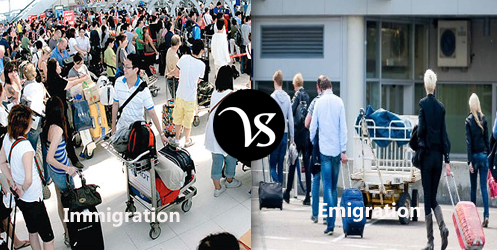 Immigration:
Immigration:
Immigration is the movement of people into another country or region to which they are not native in order to settle there, especially as permanent residents or future citizens. Immigrants are motivated to leave their countries for variety of reasons such as economic prosperity, political issues, family re-unification, escaping conflict or natural disaster or simply the wish to change one’s surroundings.
Emigration:
Emigration is the act of leaving one’s country or region with an intention to settle permanently in another. People emigrate for many reasons such as employment or improving quality of life. Emigration affects the economies of the countries involved. When the people leave a country, is decreases the nation’s labor force and consumer spending.
Differences:
| Basis | Immigration | Emigration |
|---|---|---|
| Definition (www.oxforddictionaries.com) | The action of coming to live permanently in a foreign country | The act of leaving one’s own country to settle permanently in another; moving abroad |
| Synonyms | Voyage, movement, journey, gadding, flight, voyage | Movement, removal, departure, moving, exodus, fleeing |
| Antonyms | Expulsion, exile, emigration | Inpouring, arriving, remaining, income, inflow |
| Word origin | The word immigration was originated in 1780-90, Americanism; < Latin immigrant- (stem of immigrāns), present participle of immigrāre to move into. | The word emigration was originated in 1770-80; < Latin ēmīgrātus moved away (past participle of ēmīgrāre), equivalent to ē- e- + mīgrātus (mīgr- remove + ātus -ate) |
| Called | It is also called as moving into a country. | It is also called as moving out of a country. |
| Pronunciation |
|
|
| Example in Sentence |
|
|





